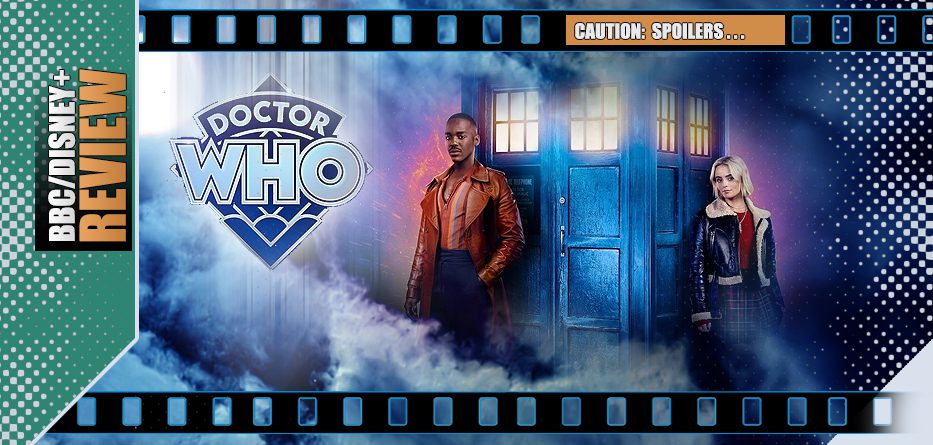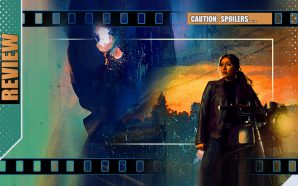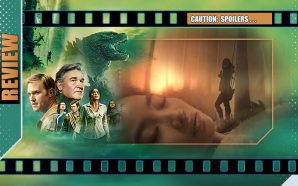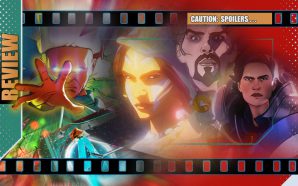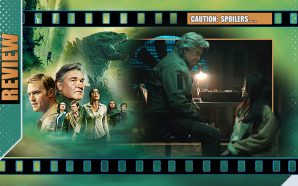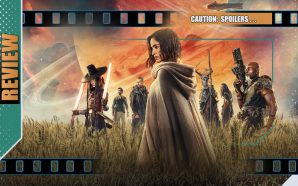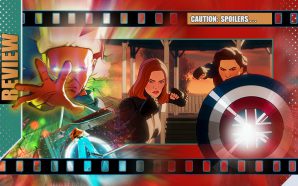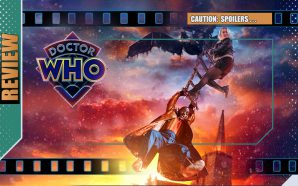Much has been written about Doctor Who over the years, with nothing so true as that it is a show that reinvents the decorations around its core remit and leaves its fans in a state of flux. Often, it’s been a case of saying that the ‘new version isn’t as good as the old version‘, a stance that may swallow itself like an ouroboros snake when the time comes around to change things up once again. But it would be churlish not to admit that the last few years have been… problematic. Jodie Whittaker is a fine actor but her Tardis tenure under showrunner Chris Chibnall had tepid results at best, somehow missing targets and veering between inconsequential entries and then mythos-busting events with a feeling that the stories were often first-draft ideas given form. Every show-runner has their quirks, fallbacks, brickbats and bouquets to deal with, but somehow tv’s Time Lord (or Lady) suddenly felt less… essential.
The Sixtieth anniversary of the show, with Russell Tiberius Davies back in charge, also divided the viewership. Davies helped bring Doctor Who back into the mainstream when the modern version of the series rematerilaised in 2005 after nearly a decade’s break. David Tennant is one of the most popular actors to essay the role (and Catherine Tate – as Donna Noble – one of the most popular companions), but their return for the three specials often felt less like a celebration of six decades and more like an extreme, if necessary, course-correction. Equally, the method of introducing the incoming Ncuti Gatwa (through a bi-generation that somehow left Tennant intact) felt entertaining but indulgent, a ‘have your dalek and exterminate it‘ affair that affected the core idea that Gatwa was the same character. (Anyone familiar with the Spider-man Clone Saga in the comics may appreciate the vaccilating narrative and weird taste it left). Then there was the Christmas special (Gatwa’s first solo-outing, underlining his more exuberant style and featuring the introduction of new companion Ruby, played by Millie Gibson) which was a more fantastical affair full of dance-numbers and talking goblins rather than cybermen and zygons. A significant portion of the fanbase loved it and, inevitably, a vocal portion loved to hate it, sharpening quills to explain how they’d be scrutinising the show in detail for reasons not to watch it anymore.
But now the real test begins. After all the pomp and circumstantial celebrations, here we have the debut of the new series ‘proper’ and a chance to evaluate the show’s strengths, foibles and sheer will of longevity. Of course, the controversies have already started (did they ever cease?). Rumours swirled that Millie Gibson had been fired even before her episodes began broadcast (and whatever their original source, it appears she’s still around – currently filming a second season, so….) and the news that the series would actually debut on Disney+ in the US (half a day before the BBC broadcast, back to Saturday nights). Cue some gnashing of teeth.
Some argued that the mere inclusion of the first openly gay actor to play the Doctor, supporting players played by trans-actors and making the Tardis more accessible to wheelchairs were all signs that the series was somehow going ‘woke’ (whatever that word or complaint means on a daily basis?) but anyone complaining about a character that can frequently change their appearance and form, sides with cosmic underdogs and has fought against injustice with two hearts but rarely fire-arms for sixty years is probably coming late to the party. Equally the very genre of ‘science-fiction’ itself has little time for those who aren’t reflecting the present through the fantastical.
So, at the risk of being edgy, let’s judge the show merely on what it delivers:
Disney+ screened two episodes – Space Babies and The Devil’s Chord – to kick-off its run and, as you might expect, each is something of a statement of intent…
Space Babies will likely continue to divide audiences. There’s lots of running, quips and doubling-down on exposition, presuming that some viewers will know nothing of its core concept or mythology or want to be reminded. For those who were, at least, around for Eccleston’s run, there’s various moments that echo back to early chapters of his travels with Rose (a companion’s first view of a planet from an orbiting space-station, the trick with the phones still working across the millennia and cosmic miles and the underlying feeling that the Doctor is evaluating them and their decisions etc). In many ways, it leans more into the obviously bizarre or gloriously slapstick silly elements. After a quick diversion into prehistoric Wyoming to demonstrate the literal ‘butterfly effect’, the Doctor and Ruby finding themselves on a space-station that seems to be maintained by a group of babies and with a monster down below. Unfortunately, the uncanny valley (nappy?) effect is there, so you’re likely to be scrutinsing and recognising the deep-fake lip-sync aspects that prove deep enough to entertain in the moment but never deep enough to convince as anything more than spritely post-production and the internal logic of the piece doesn’t hold up to more than a passing thought (The idea that the babies have intelligence beyond their apparent age has just as much potential for outright horror, but here we’re going to settle for more fun bodily-fluid opportunities for poop and snot and a PG-filter nanny-system among the obviously more wink-wink and cutesy moments).
For those who loved Peter Capaldi’s bristle and awkwardness when it came to human interaction, Gatwa’s incarnation embraces the infant-hugging a little too easily (the Thirteenth Doctor would have made every excuse to leave, but Fifteen’s only real mistake here to forget how frightening his analysis of the bogeyman might be to the toddlers). The actor is already making his mark as an enthusiastic Doctor who is doing his best to explore the more fun and lighter side of things. He’s happier than Tennant’s version, more street-wise than Smith and positively bounds around in a way that you wish Whittaker might have been allowed to do. He’s a Tigger with a Tardis, though by the time the double-bill id done, we also get to see some of the breadth he can manage.
Davies has a knack for social commentary that either bubble-under or consciously over his scripts and there’s some wry lines sprinkled in here – the idea that the corporation that owned the baby-station insists on their birth but won’t look after them thereafter is perhaps more timely than ever. Equally, at the end – and for all the previous Alien-esque references – Davies resists the story-beat of merely blasting the ‘bogey-man’ out into space, with the audience and the Doctor realising it’s not actually bad, it was just created that way and it’s the one of its kind. There’s some blatant broad strokes here and it’s lightyears away from a Genesis of the Daleks moral conundrum, but it’s the kind of zig-instead-of-zag, ‘everything counts or nobody counts’ lesson that the show has always done well. Yes, it’s highest concept in almost all ways and low in others and something that you simply go with or not. Older fans may balk and clutch their metebelis crystal necklace, but -undeniably – it’s the kind of tale aimed to pull in the all-ages family-viewing aspect of the show and that’s something Doctor Who‘s modern era has often done and needs to do. Also, it’s a frequent strategy to start small and silly and build into something larger and darker as a season progresses.
The Devil’s Chord will likely be slightly more satisfying for longer-term fans, though it still deliberately dials things up to 11 at various points. The controversial entertainer Jinx Monsoon is introduced as the Maestro, a deliriously cosmic Primadonna’ing diva and part of the Doctor’s growing side-mythology about almost-god-like dark forces from outside the known universe (such as the Toymaker) that the Doctor might be responsible for attracting. Monsoon gives us a deliberate OTT caricature, a swirling mass of vivid hair, that firmly lands halfway between Rocky Horror and IT‘s Pennywise. It’s definitely not something I’d want to see on a weekly basis – and I’m hoping that some of this new pantheon of bad-guys may end up being more fearsome than overtly flamboyant – but as a one-off maniacal concept it’s fun as a diabolical musical maelstrom. The appearance of the Beatles is fun, though none of the actors portraying the foursome look remotely like the people they’re supposed to be playing. I’m also sure that half of the US audience will have scratched their heads over the Cilla Black inclusion. This entry also feels like a throwback to Davies’ earlier run, though it’s easy to see where the Disney money went and it certainly feels like a familiar tale provided with a far bigger canvas and post-production opportunities. All that being said, the ‘silence’ sequence, eventually brought to the end by a tuning fork, is very chilling and effective. One wonders what Moffat would have made of the core concept…
For those of us with longer memories of the Doctor and who recognise Davies’ perchance for sprinkling in even older elements of the original show (with the potential to echo down through coming episodes) there’s only one word needed: Susan. Essayed by Carole Ann Ford when the series launched in 1963, the Doctor’s granddaughter appeared in the show’s first and second season before she fell in love with a freedom-fighter in 1964’s The Dalek Invasion of Earth. Susan was torn between staying with her new love or continuing to care for her grandfather, but the Doctor makes the choice for her, leaving her in her new home and promising that one day – yes, one day – he will come back for her. Despite an appearance in the 1983 special The Five Doctors and some potentially non-canon aspects in spin-off media, Susan has been off-camera ever since and it definitely feels like Davies is speeding her potential return. Here, the Doctor – standing on a rooftop over London – overtly mentions that being back in the 1960s, he can imagine that Susan is out there, still living in the junkyard where the series ‘began’ and notes that he’s not sure if she survived more recent time-war and Gallifreyan upheavals. Adding fuel to the fire if you’re conspiratorial enough, there’s an actor who keeps turning up as different characters and, rumour has it will continue to do so. SUSAN TWIST appeared as a Mrs Merridew in Wild Blue Yonder and an uncredited heckler at Ruby’s band’s concert in the recent Christmas special and turns up in The Devil’s Chord as an Abbey Road tea-lady. Coincidence, you say? Hmmm…add to that and the song that wraps things up is ‘There’s always a Twist at the end‘. It certainly feels like breadcrumbs and one wonders if Susan’s return (is she the ‘one who waits‘) is setting her up as a big bad (I hope not) or whether desperately seeking Susan is going to be the story-arc that somehow twists around Ruby’s own origins. On that front, Doctor Who has form for taking a female companion and making her a character the entire universe ends up pivoting around… Rose, Donna and – obviously Clara. Hopefully whatever impossible secret lies at the heart of Ruby’s origin, it will be interesting and satisfying not merely cosmic and world-breaking once again.
Perhaps not then a blistering start, yet then as far as these older eyes see it, but Doctor Who continues, as it must, to evolve and to do so it will never be the consistent cat-nip it once was for some… yet, it’s inevitable that painted wings and giants’ rings eventually make way for other toys and other tastes. But even as it loses some devotees – some heading off quietly into pastures new and others slamming the door as they repeatedly announce their rotating exit – the fact is that Doctor Who is still the fantastical force it was and one clearly knows the way to bring in more, renewing both itself and its remit. Like music that turns from signature tune to just a noise, tastes change, especially those fuelled by nostalgia. Louder and prouder it might strut under the combined BBC/Disney banner, but every generation gets its Doctor and the current custodian of the title has enough energy to propel it onward whether you are onboard or not.

